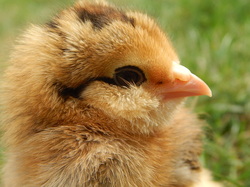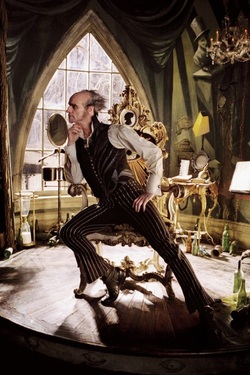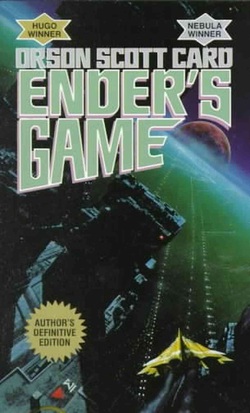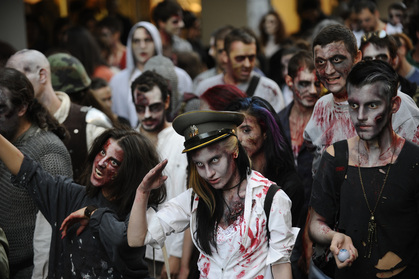 A few weeks ago, the teen book club met to discuss Charles Dickens' book Oliver Twist. Out of the twelve regular attendees of book club, only three actually tackled reading Oliver Twist, while the other students opted to read the other book choice. When we met as a group, though, I realized how tough the book was for the students to read. Those who did read the book liked it for the following reasons: the language was lyrical and challenging, the author used caricatures and sarcasm which was expertly done, and the characters were engaging. All of these reasons seemed valid, of course, and honorable. But then the students expressed this notion: It feels as though there is a hidden message in the text. I've always hated it when students develop this idea about books. It makes it seem as though only detectives, literary sleuths or English PhDs can discover the meaning of the books, making it somewhat inaccessible for the regular reader. I simply don't want my students to think that's the case. I want them to believe that they can discover the meanings in the text without needing an expert to pull it out for them. The problem is, Oliver Twist is very much a reflection of the time when Dickens wrote the book. Through Oliver's experiences, Dickens is criticizing government and church funding of the work houses, where those in need of monetary support would go if they wanted governmental help. How would the students know this if they didn't research the book and discover this information? Does that mean there is a secret message in the book that someone reading wouldn't discover simply through the book's pages? I guess we are getting into literary analysis here and reader response versus historical analysis, but as the book club mentor, I would like the students to feel that their understanding of the book as is works. That it's okay to examine the book from a teen perspective with a teen's knowledge and experience, and take something from it. This isn't a secret message. There isn't hidden meaning. Perhaps there are different levels of understanding, but all levels are okay. Right?
2 Comments
 I was surprised and not surprised by the book club's Christmas wish list. I was not surprised by the desire for the two follow-up books after Divergent since the students loved that book and want to read the next one before the movie comes out in the spring. I was a bit surprised by the Kurt Vonnegut book, Cat's Cradle. When students take risks, go outside of the current popular books and best sellers, I remember what it means to be a teen reader - how I loved some of those classics when I was their age, and how we sometimes overlook the literary greats in our attempts to hook kids into reading. Yes, The Catcher in the Rye is still a book that some students fall in love with. They appreciate Holden's critical eye and recognition of all things phony. Yes, students fall in love with language all over again when they read Dickens, Fitzgerald, Shakespeare. Yay to kids who want to delve into Tolkien and take on The Silmarillion. You know what? Kids do still read the challenging works and I love it when I see that. My book club's Christmas wish list: 1. Insurgence 2. Allegiance 3. Will Grayson, Will Grayson 4. Kill you Twice 5. Skin Jacker Trilogy 6. The Silmarillion 7. Ender's Game 8. Earth Awakens 9. Hunger Games Trilogy 10. Cat's Cradle  I saw, recently, that Lemony Snicket had been present at a local Portland bookstore, signing books. I missed the event. I was very intrigued to discover who this Lemony Snicket character might be. I understand that Daniel Hadler writes under the pen name, Lemony Snicket, but who shows up for a book signing when the author's name is Lemony Snicket? Would that be Daniel Hadler or someone acting the part of Lemony Snicket? Hmm. About ten of the students in the book club read "A Series of Unfortunate Events" book #1. It was a fast, easy read for these teenagers and even though they liked it, they were pretty quick to criticize, which here means finding fault. Most of them did not seem to understand the humorous technique that the author employs of using a somewhat difficult word and then defining it for the reader. Example: "Violet was sleeping fitfully - a word which here means "with much tossing and turning" - on the lumpy bed." (81). The high school students were highly critical of this technique, claiming that it felt patronizing, which here means talking down to. "But what about the humor?" I asked. "It's not funny," they claimed. "What about when he describes "adversity" as "Count Olaf"?" "Well, that was slightly hysterical, which here means extremely funny, but that was the only one." "Did you get that sometimes the definitions weren't quite right?" "Well, duh," they said, which here means that is really obvious and stupid. I have to admit that when a teenager says "duh," it's really difficult to come up with a witty comeback. After the discussion, I felt that these students were a bit too old for the book. Honestly, there seems to be a weird middle ground where teens are too old for middle grade books, and then they like them again when they're young adults. I'm not sure why this is except that perhaps we become more accepting when adults, a little less hyper critical, and we can acknowledge the humor without feeling condescended to, which here means patronized.  On Thursday, November 21st, book club met to discuss our book choices for this month. We had chosen to read books from two different series: Divergent by Veronica Roth, and A Series of Unfortunate Events by Lemony Snicket. What we ended up discussing was why book series seem to be so popular and what to do when we hit on a good one. According to our discussion, the main reason book series seem so popular is that when students find something good, they stick with it. Isn't that the truth. If we go back to past series, ones that I would have read when I was a kid, The Narnia Chronicles, Anne of Green Gables, and The Little House on the Prairie all come to mind. I'm pretty sure that I read every Bobbsey Twins book I could find. We had The Hardy Boys, Nancy Drew, and The Lord of the Rings. These are great books and why would we read just one when the story leaves you hanging and when the development of those characters and that plot line are so powerful? Yes, we love series because when we find a really good book and well-developed characters, we have a hard time saying goodbye to them. Where does that leave us in our book club? The problem with a series in book club is that we have a difficult time reading just one book and then putting it aside. Students want to read the next book in the series and if we move on to a different choice, we might lose some of that initial enthusiasm for the book. And yet, the purpose of our teen book club is to discover books out there that really peak our interest. If we settle on one type of book and don't stretch ourselves to discover others, we are limiting our exposure to books, which is not the point of reading and discussing. The other issue with reading only one type of book is that sometimes that particular series doesn't work well with some of the readers in the club. They then become frustrated with our book selections and might discontinue their enrollment in the club or they might limit their comments. Definitely not what we'd like to see. So yes, we decided that reading the first book in a series is fine, but then the members of the club may need to read the next few in the series outside of the club. And we decided that's okay. Will we continue reading the Divergent Series and The Series of Unfortunate Events? Of course, but not in a group setting. For next month, we'll be reading Dicken's Oliver Twist.  We chose to read Ender's Game as one of our book selections for the end of October. Ender's Game is one of those books that really hits home with kids. The protagonist is a misfit who is brilliant and gifted, the adults in the book are manipulative and, well, demented, and the lesson to be learned from the book is valid. The discussions in book club were fantastic. Because the adults in the book manipulate the children, we spent quite a bit of time discussing whether or not this is justifiable. And you know what? The students claimed that it was. The adults, according to the students, are justified in their manipulation because in the end, they are simply trying to build an adequate general to fight off the buggers. We also discussed how far Ender goes to protect himself. In two different situations within the book, Ender fights another boy, and fights him to the point where he knows the boy won't come after him again. This brought up issues of bullying and many of the students at our little charter school have been bullied. The students claim that again, Ender did the right and justifiable action; otherwise he would have been severely hurt himself. I have to admit, I was on the other side of this one and didn't agree, but I was voted down. Lastly, we discussed the ultimate message of the book. Is it okay to destroy another species (or culture) simply because we are unable to communicate with them, and why do humans seem to react in this way so quickly and often? We sited many examples from history where wars were started due to lack of communication, and where a culture was decimated because another culture didn't understand them. This is a profound and honest look at who we are as human beings and it makes us examine our priorities and aggressive techniques. This is a great book to discuss with adolescents. So many of the issues relate to their lives in some way and many of the themes contain multiple points of view. Thanks, Orson Scott Card, for developing a book that teens relate to on a personal level, but also brings them to a level of thinking that goes beyond black and white. Well, the October meeting for the teen book club was a very interesting meeting. About half of the students had read 100 Cupboards by N.D. Wilson, and the other half had read The Princess Bride by Goldman.
Now, if you've ever seen the movie of The Princess Bride, you know that the story has a good deal of off-beat humor and pretty hysterical characters. The book is no different. In fact, the movie follows the book very closely, but only the story of Buttercup and Wesley. In the book, there is a whole other story that makes a superficial appearance in the movie. It is the story within a story. This is where it got interesting in book club. Because the book seems to walk a line between fiction and non, the students debated how one should read the book. Obviously the story about Buttercup and Wesley is fiction. There just aren't any ROUSs around. But the story built around Buttercup's story is partially true. Goldman includes himself in the book, along with his son, wife, grandson, publisher, contacts in Florin and Stephen King. Some of his included life seems to be true - Goldman really did work on the screen play for Butch Cassidy and the Sundance Kid, and we all know that Stephen King is alive and well. But what about his son? What about the wife he writes about who isn't terribly affectionate and overanalyzes his every move? Are they real? And if not, how do we know what's real in the book and what's not? Here's what the students decided: Believe what you will. We debated for a good twenty minutes on the differences between reading fiction and non. When these particular teens read fiction, they don't care about honesty, research or truthful telling. They just want a good story. But when these teens read nonfiction, they want the truth. They want it well documented, they want to be able to look up the information and confirm authenticity, and they want honesty. Somehow, this book walks the line between fiction and non. And you know what? The teens in my book club did not care. They LOVE this book. They love the story in a story; they love the reference to Stephen King; they love the background story of Fezzig. When I informed the students that Goldman doesn't actually have a son, but has two daughters, one of the girls screamed in frustration and told me I'd ruined the book for her. She decided that she would believe what she wanted and if she wants Goldman to have a son, then that's what she's going to believe. And I decided that I wouldn't tell her that Stephen King does not actually have any relatives in Florin. Teen Book Club for the 2013-2014 school year is underway! We met in September, we chose our books, and we've had our first meeting. I love book club.
This is how our book club works. Students sign up for elective credit through our small charter school, they agree to the terms (read a book a month, attend the meetings to discuss, post discussion questions to the discussion board), and they completely control the books we read. We throw up about fifty books on the board (all suggestions from them) and then we choose two to read per month. As the facilitator, all I do is sit back and count the votes. Trust me, they can get upset if their book doesn't make the list! I was pretty surprised by the book choices this year simply because they didn't seem to have a main theme. Last school year was the year of the zombie and we read more zombie books than we've ever read before. This year seems to be the year of the books - about-to-come-out-as-movies. Because we usually take a field trip to go see the movie of a book we've read, I think the students were trying to get as many on the list as they could. Here is the list: 100 Cupboards The Princess Bride Ender's Game The Hobbit Divergent (#2) A Series of Unfortunate Events (#1) Oliver Twist Catching Fire Unwind Artemis Fowl (#1) The first two, 100 Cupboards and The Princess Bride were the books chosen for October. And now we march forward and read the books. Stay tuned for The Princess Bride discussion! The 2012-2013 school year in our book club was the year of the zombie books. We read The Zombie Handbook, World War Z, The Forest of Hands and Teeth, and This is not a Test.
In all honesty, I am not a lover of all-things-zombie; in fact, I find them creepy, disturbing, and rather unintelligent. When I saw our list at the beginning of the year and took note of all the zombie books, my immediate thought was, there's no way I'm reading all of those zombie books. And then I started reading them. Who would have thought that sane, intelligent human beings could talk about the water--soluble-properties of zombies for half an hour? This became our main point of discussion with the book World War Z. The teens in my book club wanted to know how the zombies could survive in the water. How could they walk across the bottom of the ocean and come up on the other side without falling apart? How could they stay in the water for days, even weeks, without disintegrating or swelling? Wouldn't the zombies become terribly bloated and then not be able to walk? Wouldn't they fall apart? How does one find the answer to these questions when zombies don't exist? I had students researching the effects of prolonged water submersion on dead bodies. It seems, according to my teen readers, that if a body is in water, it isn't broken down the same way it would be on land. It develops a type of protective coating that preserves it, helping it to maintain its shape. In fact, bodies can come out of water surprisingly well preserved. The things we can learn in book club, eh? By the end of the semester, we considered ourselves zombie experts and came to the conclusion that zombies are just like Hobbits: they exist simply because someone dreamt them into being and when someone creates a new character, that writer can make the creature behave in whatever way feels believable and true. Our hats go off to the zombie book authors. |
Chris Struyk-Bonn
I have had a few jobs in my life that I didn't enjoy: detassling corn, working in a small motor parts factory, framing pictures, serving food, and rejecting bad eggs in an egg factory. Today, I take part in a book club for teens and I love every minute of it. Archives
July 2015
Categories
All
|

 RSS Feed
RSS Feed
